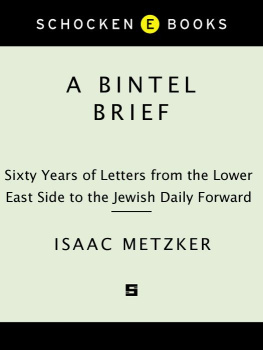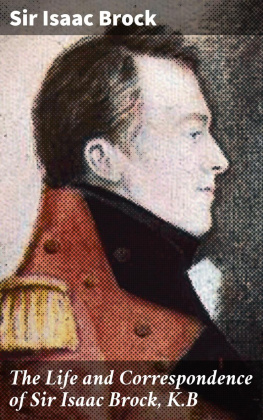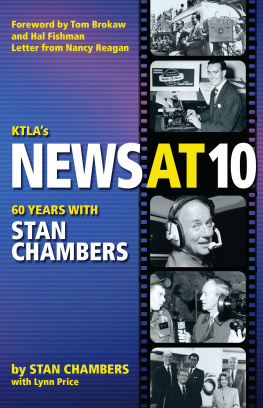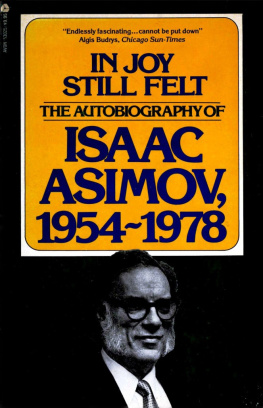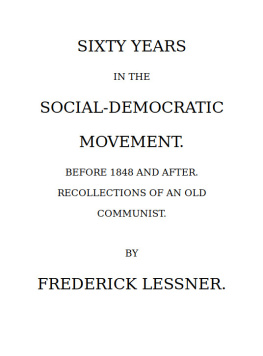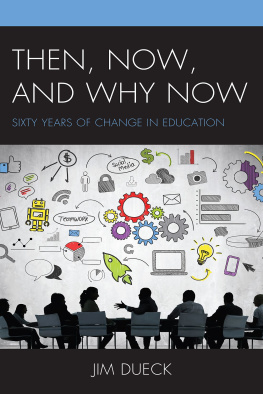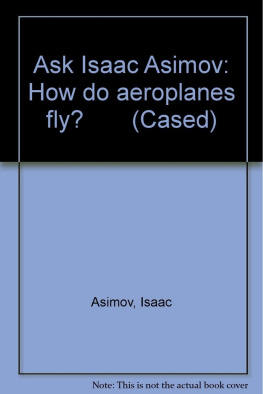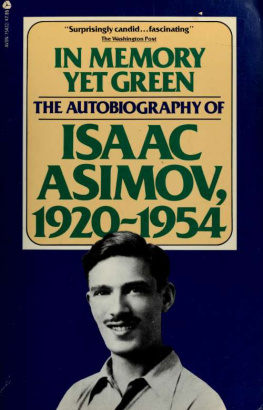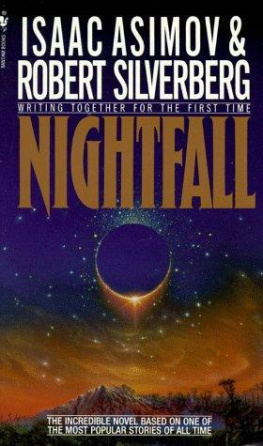Isaac Metzker [Metzker - A Bintel Brief: Sixty Years of
Here you can read online Isaac Metzker [Metzker - A Bintel Brief: Sixty Years of full text of the book (entire story) in english for free. Download pdf and epub, get meaning, cover and reviews about this ebook. year: 2011, publisher: Knopf Doubleday Publishing Group, genre: Home and family. Description of the work, (preface) as well as reviews are available. Best literature library LitArk.com created for fans of good reading and offers a wide selection of genres:
Romance novel
Science fiction
Adventure
Detective
Science
History
Home and family
Prose
Art
Politics
Computer
Non-fiction
Religion
Business
Children
Humor
Choose a favorite category and find really read worthwhile books. Enjoy immersion in the world of imagination, feel the emotions of the characters or learn something new for yourself, make an fascinating discovery.
- Book:A Bintel Brief: Sixty Years of
- Author:
- Publisher:Knopf Doubleday Publishing Group
- Genre:
- Year:2011
- Rating:5 / 5
- Favourites:Add to favourites
- Your mark:
- 100
- 1
- 2
- 3
- 4
- 5
A Bintel Brief: Sixty Years of: summary, description and annotation
We offer to read an annotation, description, summary or preface (depends on what the author of the book "A Bintel Brief: Sixty Years of" wrote himself). If you haven't found the necessary information about the book — write in the comments, we will try to find it.
Isaac Metzker [Metzker: author's other books
Who wrote A Bintel Brief: Sixty Years of? Find out the surname, the name of the author of the book and a list of all author's works by series.
A Bintel Brief: Sixty Years of — read online for free the complete book (whole text) full work
Below is the text of the book, divided by pages. System saving the place of the last page read, allows you to conveniently read the book "A Bintel Brief: Sixty Years of" online for free, without having to search again every time where you left off. Put a bookmark, and you can go to the page where you finished reading at any time.
Font size:
Interval:
Bookmark:


Translation and Introduction Copyright 1971 by Isaac Metzker
Foreword and Notes Copyright 1971 by Doubleday & Company, Inc.
All rights reserved under International and Pan-American Copyright Conventions. Published in the United States by Schocken Books, Inc., New York. Distributed by Pantheon Books, a division of Random House, Inc., New York. Originally published by Doubleday & Company, Inc., in 1971.
Library of Congress Cataloging-in-Publication Data
A Bintel brief: sixty years of letters from the Lower East Side to the Jewish daily forward / edited and with an introduction by Isaac Metzker ; foreword and notes by Harry Golden.
p. cm.
Reprint. Originally published: Garden City, N.Y. : Doubleday, 1971.
eISBN: 978-0-307-78700-2
1. JewsNew York (N.Y.)Social life and customs. 2. ImmigrantsNew York (N.Y.)Social life and customs. 3. Forverts. 4. Yiddish newspapersNew York (N.Y.)Sections, columns, etc.Letters to the editor. 5. Yiddish newspapersNew York (N.Y.)Sections, columns, etc.Advice. 6. Lower East Side (New York, N.Y.)Social life and customs. 7. New York (N.Y.)Social life and customs. I. Metzker, Isaac, 1902 . II. Forverts.
[F128.9.J5B46 1990] 89-43286
974.71004924dc20
The Lower East Side photographic portfolio in this book has been provided through the courtesy of the Jewish Museum, New York, New York
v3.1
Lewis W. Hine, George Eastman House, Rochester, New York
Edwin Levick, Library of Congress, Washington, D.C.
Lewis W. Hine, George Eastman House, Rochester, New York
Lewis W. Hine, George Eastman House, Rochester, New York
Unknown photographer, Library of Congress, Washington, D.C.
Lewis W. Hine, George Eastman House, Rochester, New York
Unknown photographer, Library of Congress, Washington, D.C.
Alice Austen, Alice Austen Collection, Staten Island Historical Society
Jessie Tarbox Beals, Community Service Society, New York, New York
Lewis W. Hine, George Eastman House, Rochester, New York
Jacob A. Rus, The Jacob A. Rus Collection, The Museum of the City of New York
Lewis W. Hine, National Committee on Employment of Youth, New York, New York
Lewis W. Hine, George Eastman House, Rochester, New York
Lewis W. Hine, George Eastman House, Rochester, New York
Lewis W. Hine, National Committee on Employment of Youth, New York, New York
Lewis W. Hine, George Eastman House, Rochester, New York
Lewis W. Hine, National Committee on Employment of Youth, New York, New York
Unknown photographer, International Ladies Garment Workers Union
Unknown photographer, Amalgamated Clothing Workers of America
A Bintel Brief was translated by Diana Shalet Levy.
I wish to express my gratitude to my wife, Bella S. Metzker, for assisting in the translation, for helping me with the revision and corrections of the manuscript.
I.M.
In 1880 when America had a population of fifty million, one quarter of a million of that total were Jews. The majority of these Jews were German and Sephardic who had come here with the languages of the countries in which their families had lived for generations. The new immigrants whose mother tongue was Yiddish were at that time in the minority.
The mass immigration of the Yiddish-speaking Jews from Eastern Europe started in the early 1880s. They were fleeing from the bloody pogroms in Russia and Rumania and from poverty and persecution in other Eastern European countries.
The mass immigration of Jews to the United States was like the wandering of peoples in ancient times and it seemed for a time that some of the Eastern European countries would be completely drained of their Jewish populations. The situation might possibly have come to that point, in fact, had it not been for the passage of strict quota laws at the beginning of the 1920s which all but closed the gates of America to these immigrants.
From 1881 to 1925, however, 2,650,000 Jewish immigrants managed to come to America from Eastern European countries alone. At that time this total amounted to a third of the Jewish population of all of Eastern Europe.
Wonderful tales had come from remote America to the Jews in Eastern Europe, even to the most far-flung towns and villages where no railways ran. Such magic words as Golden Land, Freedom, Equality, had animated themsomewhere, across the great ocean, a new land was being built, founded on freedom and equality for all people, a refuge for all who were suffering and persecuted.
For the impoverished and tormented Jews, these tales seemed the fulfillment of their dreams of finding a haven for themselves and their families, a place somewhere under the sun where they could have peace and live like human beings. These dreams and the tales they heard gave them the courage to set out for this country on the long quest for freedom and bread. They plodded along Europes paths and roads, stole across borders in the dark of night, traveled by horse and wagon and train, endured a long painful voyage across the stormy ocean.
On the American shore, near Ellis Island, the Goddess of Freedom held high the bright torch for the immigrants. She enticed them with promises and stimulated their imagination. Many of them believed that as soon as they disembarked from the boat they would find heaven on earth and an end to all their suffering. But they were to experience many bitter disappointments in the new land.
In those years when new Jewish immigrants were arriving daily from Eastern Europe, committees were formed among the Jews already settled to encourage the newcomers to go west. But a great many of them preferred to remain near the shore where they had left the ship. They settled in the old tenements of New York, primarily in a small area of the Lower East Side. There, crowded together, they stayed near landsleit who had migrated before them, or near friends who had come on the same boat.
It did not take them long to find out that no luxuries awaited themthat one had to struggle hard here for the necessities of life. The transition from their old way of life in the shtetel to a new life in the seething, vast city of New York was not an easy one to make. Back home, everything had been founded on traditional Judaism. There the Sabbath was sacred. Even an unbeliever would not dare desecrate the Sabbath in public. Kashruth was carefully observed; the Jewish holidays were properly celebrated. Even few enlightened men in small towns would dare to trim or shave their beards.
Thus had the Jews conducted themselves within strong traditions for generations and generations. Now, suddenly, they were thrust into a totally different world where they found it necessary to break with tradition and flout time-honored laws. They went to work on the Sabbath, they shaved their beards, and many of them began to eat non-kosher foods.
The green years were difficult and full of problems for the immigrants. Thousands and thousands of them were drawn into the needle trades and many found other types of employment. Working men and women at that time were not yet organized, and the majority of them were terribly exploited by their bosses. These were the days of the real sweatshop system. Not only the adults but children too worked under the worst conceivable conditions often seven days a week, twelve and even fourteen hours a day, and for miserable wages. The immigrants lived in poverty, crowded in small damp rooms without daylight or fresh air. In the summer it was hard to breathe in the tenements and during the stifling nights they often slept by the thousands on the roofs.
Font size:
Interval:
Bookmark:
Similar books «A Bintel Brief: Sixty Years of»
Look at similar books to A Bintel Brief: Sixty Years of. We have selected literature similar in name and meaning in the hope of providing readers with more options to find new, interesting, not yet read works.
Discussion, reviews of the book A Bintel Brief: Sixty Years of and just readers' own opinions. Leave your comments, write what you think about the work, its meaning or the main characters. Specify what exactly you liked and what you didn't like, and why you think so.

